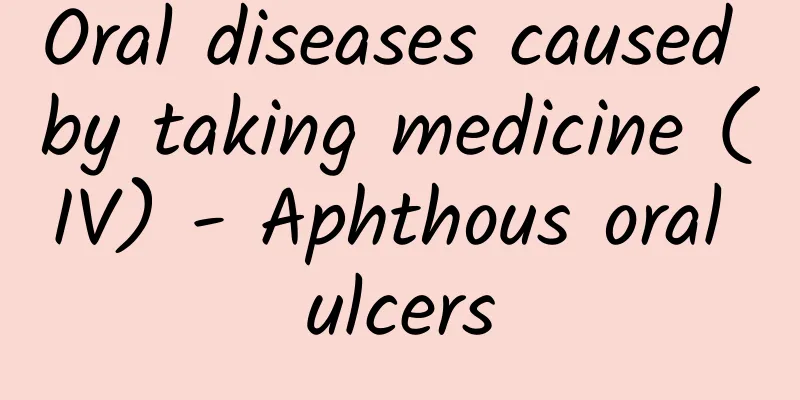Oral diseases caused by taking medicine (IV) - Aphthous oral ulcers

|
Many people are familiar with oral ulcers. The most common type of oral ulcer in life is recurrent aphthous ulcer, also known as recurrent aphthous ulcer. It is one of the common oral mucosal diseases with unknown etiology and is prone to recurrence. Unlike recurrent aphthous ulcers, drug-induced oral ulcers, aphthous-like oral ulcers, have relatively clear causes. When the underlying cause is effectively controlled, these ulcers will disappear. There are several types of drugs that may cause drug-induced oral ulcers. 1 Nonsteroidal anti-inflammatory drugs Nonsteroidal anti-inflammatory drugs (NSAIDs) were the first class of drugs found to be associated with aphthous oral ulcers. Piroxicam , which may contain a thiol group, can cause this type of ulcer. In addition, naproxen and rofecoxib are also associated with the occurrence of aphthous oral ulcers. 2 Mammalian target of rapamycin inhibitors Patients with metastatic disease treated with mammalian target of rapamycin (mTOR) inhibitors , such as sirolimus , temosilimus , everolimus, and lidaformolimus, develop aphthous oral ulcers. Unlike idiopathic recurrent oral ulcers, these ulcers resolve completely without recurrence after cessation of treatment. Source: References 3 Conventional chemotherapy drugs Conventional chemotherapy drugs, such as 5- fluorouracil , cisplatin , methotrexate , and hydroxyurea, are orotoxic and can cause oral ulcers and ulcerative mucositis. These ulcers tend to be larger and more diffuse, and their appearance differs from the oval, well-defined, recurrent aphthous ulcers. 4 Other drugs Mycophenolate mofetil has been reported to cause ulcers on the tongue, palate, lips, and gums of solid organ transplant recipients, but these ulcers resolve after discontinuation of the drug, as with tacrolimus. Rare cases of ulcers associated with multitargeted kinase inhibitors (MTKIs) have also been reported. In addition, trimethoprim-sulfamethoxazole (Compound Xinruoming) and losartan (angiotensin receptor blocker antihypertensive drug ) are also related to the occurrence of aphthous oral ulcers. References [1] Yuan A, WooSB. Adverse Drug Events in the Oral Cavity[J]. Dermatol Clin, 2020, 38(4): 523-533. |
>>: What is the difference between soy milk, soy juice and soy milk? Can they replace milk?
Recommend
What should I do if I drink liquor in the first month of pregnancy?
Everyone knows that you must not drink white wine...
Does “mouth breathing” really make you ugly? I’ll never dare to do it again after reading this…
If you enter the keyword "mouth breathing&qu...
How to take pangolin powder to promote lactation? What Parenting Experts Say
Many women find that they have very little milk a...
What to do if breast hyperplasia always hurts
Women all hope to have healthy breasts, but due t...
40 days after menopause, the test paper shows one line
When it comes to pregnancy, some people may think...
What happens if the leucorrhea is gone?
As we all know, leucorrhea is a barometer of wome...
How can exercise shrink the vagina?
The tightness of the vagina also has a certain im...
Nine-valent cervical cancer vaccine
Since the cervical cancer vaccine was launched, m...
Can I drink tea during my period?
Can I drink tea when I have my period? In fact, t...
What is the reason for yellow leucorrhea with odor?
Many female friends have abnormal leucorrhea in t...
Is it good to use pull bait to catch crucian carp in late autumn and winter? How to open the bait when fishing crucian carp in low temperature?
The pull bait is very soft and can be easily suck...
How to eliminate acne caused by endocrine disorders in women
Appearance is something that many beauty-loving f...
What are the symptoms of late-stage ovarian cancer complications?
Women with advanced ovarian cancer will experienc...
What to do if your uterus is cold?
As the saying goes, "Nine out of ten women s...
What causes women's hands to burn?
Qi and blood are precious substances that nourish...









